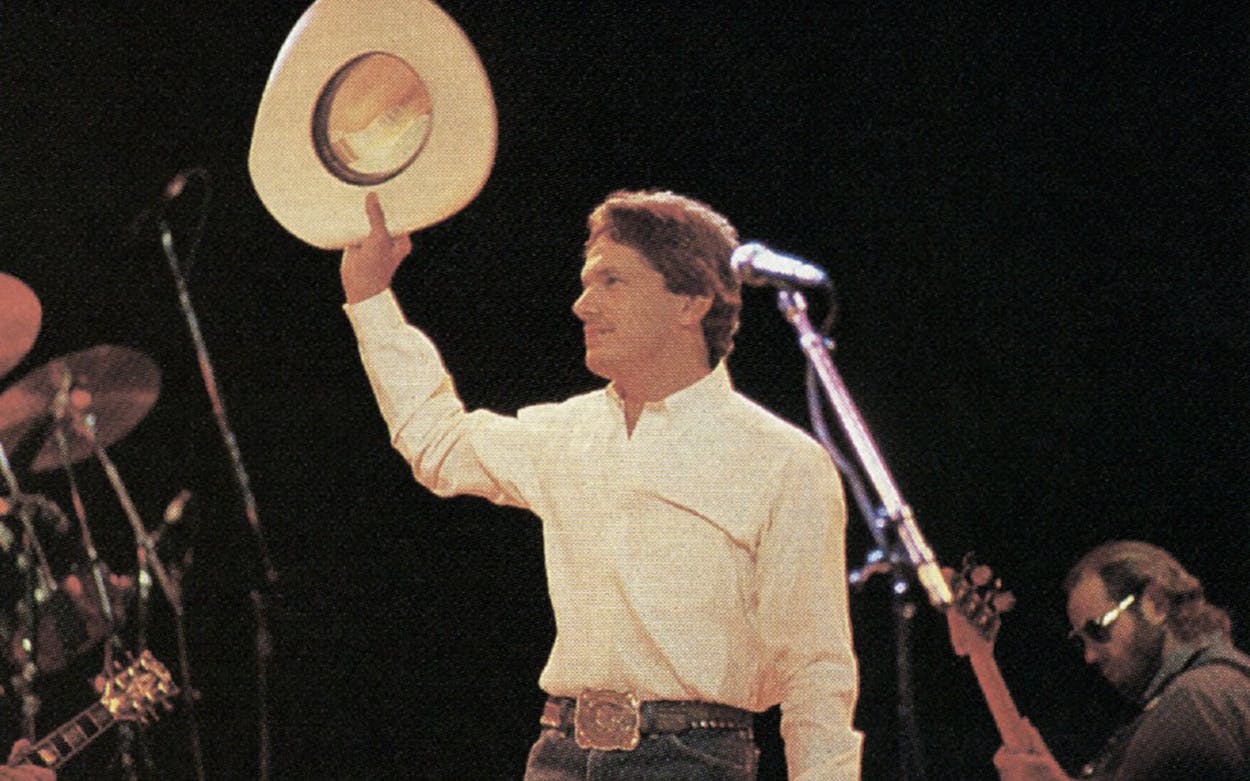This story is from Texas Monthly’s archives. We have left the text as it was originally published to maintain a clear historical record. Read more here about our archive digitization project.
The Fall of Country
As country music sought to shed its hillbilly image and make itself more appealing to middle America, the powers in Nashville strove for a sound that offended the fewest number of potential listeners. That made accents and other homespun affectations liabilities, effectively taking the country out of country. The end result was music that almost choked on its own confection.
1970 The Flatlanders, Texas’ first country-folk-rock band, consisting of Joe Ely, Butch Hancock, and Jimmie Dale Gilmore, go to Nashville to make a record. Final product is rejected as unmarketable.
1971 Willie Nelson releases Yesterday’s Wine; RCA refuses to promote it, calling it “too spooky.”
1972 Johnny Bush (above), the Country Caruso, loses his voice. “Whiskey River,” the all-time Texas two-step classic, may never sound the same again.
1973 Marie Osmond hits top of country charts with “Paper Roses” (below).
1974 Dolly Parton leaves Porter Wagoner and reshapes her music into slick country pop. Wagoner sulks and restyles his blond pompadour with a mod permanent.
1975 George Jones is divorced by Tammy Wynette, breaking up country’s greatest singing duo.
1976 Kenny Rogers breaks up the First Edition (above) and embarks on a new career as a country-pop crooner, eschewing pedal-steel guitars for syrupy string orchestration. RCA releases Wanted: The Outlaws (below), featuring old tracks by Willie Nelson, Tompall Glaser, Waylon Jennings, and Jennings’ wife, Jessi Colter. A marketing scam, it goes platinum.
1977 The Oak Ridge Boys, a male gospel group, go secular with their first Top 10 hit, “Y’all Come Back Saloon” (above), and country’s version of the Village People is born. KOKE-FM in Austin, America’s first progressive-country radio station, drops the format for middle-of-the-road music.
1978 Country comes to New York as The Best Little Whorehouse in Texas begins a four-and-a-half-year run on Broadway and the Lone Star Cafe opens. There’s a run on cowboy boots and hats in Manhattan.
1980 The film Urban Cowboy (below) does for Gilley’s and the two-step what Saturday Night Fever did for discos. A temporary, artificial market is created, which the industry panders to with watered-down apologists like Eddie Rabbitt, the Bellamy Brothers, and Barbara Mandrell. The dark ages begin.
1982 Bill Mack is fired from WBAP-AM in Fort Worth. His Midnight Cowboy truckers show is silenced.
1984 Ernest Tubb, the last of the great Texas honky-tonk singers, dies at seventy.
1985 All image, no meat, Alabama (above) is voted America’s favorite group in a People magazine poll.
1986 Country record sales slump to $75 million annually, from a peak $250 million in 1981.
1988 Billy Bob’s Texas in Fort Worth closes, ending the Urban Cowboy era.
The Rise of Country
Meanwhile, back in Texas, industry outsiders decided to establish their own vision of country without apologies. Relying on time-honored traditions and audience reaction, they gave the tired old war-horse a shot of Geritol. Eventually, the ruckus raised in Texas by people like George Strait was heard in executive boardrooms in Tennessee. The sales figures told the tale.
1972 Willie Nelson, relocated from Nashville to Austin, plays his first show at the Armadillo World Headquarters, discovering an entirely different audience in the process. KOKE-FM in Austin invents Super Roper radio format. Progressive country is born.
1973 Bob Wills and His Texas Playboys’ For the Last Time boxed album set (above) is recorded, triggering a revival in Western swing music.
1974 Michael Murphey, the Cosmic Cowboy, leaves Austin for Colorado.
1975 Austin City Limits (below) debuts on the Public Broadcasting Service and becomes TV’s longest-running popular music series, providing a showcase for new country artists. Emmylou Harris (above) forms the Hot Band. Various members will go on to become the powerbrokers of Nashville’s new establishment in the eighties: Tony Brown and Emory Gordy will be the town’s most sought-after record producers, Rodney Crowell of Houston (a.k.a. Mr. Rosanne Cash) will become country’s favorite singer-songwriter, and Ricky Skaggs will almost single-handedly revive bluegrass. Willie Nelson records Red Headed Stranger (above).
1982 Johnny Bush regains his voice. “Whiskey River” is once again heard as it was meant to be.
1984 George Strait (above) is recognized as the male vocalist of the year by Billboard magazine and the Academy of Country Music. He will repeat the feat the next two years.
1986 Lyle Lovett’s folk-country debut album lands four singles on the charts.
1987 George Strait sets the attendance record at the Houston Livestock Show and Rodeo in the Astrodome, transforming the arena into the world’s largest honky-tonk, as 49,246 people sing along to “All My Ex’s Live in Texas.” His Greatest Hits goes platinum. Nanci Griffith appears on The Tonight Show. Porter Wagoner goes back to his old pompadour, exceeded in height only by Lyle Lovett’s hair.
1988 Dolly Parton’s network variety show is canceled. Bill Mack returns to his midnight shift on WBAP-AM, and truckers rejoice nationwide. Austin’s Asleep at the Wheel (below) wins a best country instrumental Grammy for its Western swing original “String of Pars,” the band’s first Grammy in a decade. Mickey Gilley sues club owner and manager Sherwood Gryer and regains rights to his name.
- More About:
- Music
- TM Classics
- Country Music
- George Strait








